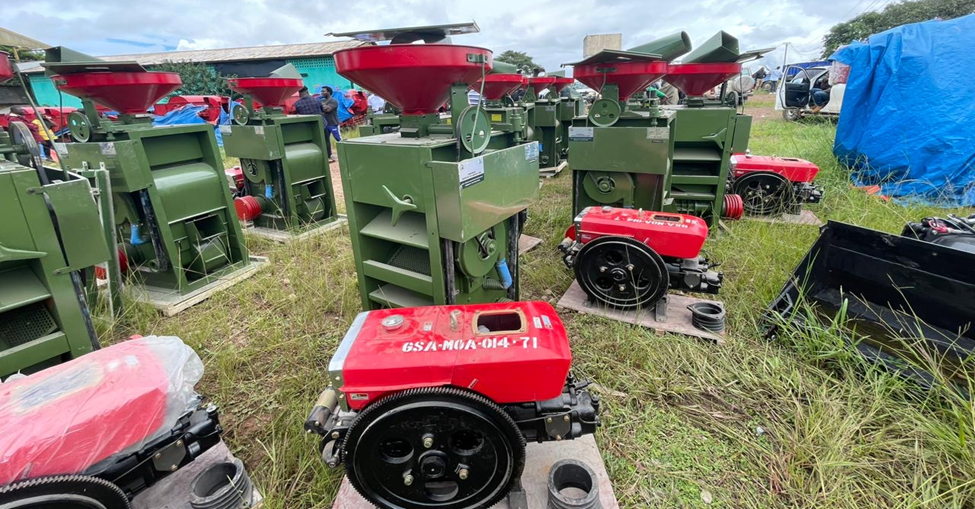Smallholder farmers often grapple with significant challenges, primarily stemming from limited access to modern agricultural equipment, technical knowledge, and expertise in machinery operation and maintenance. Consequently, this hampers their overall productivity and ability to effectively store and distribute agricultural products. Recognizing these pressing issues, the Ministry of Agriculture (MOA) in Liberia has initiated a transformative program aimed at enhancing the farming capabilities of smallholder rice producers in Bong, Lofa, and Nimba counties. This initiative, which began on October 14, 2024, involves the distribution of advanced rice processing equipment, a move supported by funding from the World Bank through the Rural Economic Transformation Project (RETRAP). This program aligns with the Liberian government’s broader objectives as detailed in the “Liberians Feed Yourself Agenda” under the National Agriculture Development Plan (NADP 2024-2030) and seeks to improve food security across the nation.
The distribution of equipment runs from September 19 to 22, 2024, where a total of 30 rice-producing farmers were selected to receive a suite of modern tools. These include solar dryers, hermetic storage bags, winnowers, threshers, de-stoners, digital scales, and small-scale rice mills. The implementation of these modern machines is anticipated to significantly streamline the rice processing workflow, mitigate the amount of manual labor required, and ultimately elevate the quality of the crops produced. Smallholder farmers, who are typically hindered by the lack of advanced technology, will now have better tools at their disposal, empowering them to improve productivity and tackle the pervasive issue of post-harvest losses, which is a persistent problem in agricultural sectors around the world.
During the equipment distribution ceremony held at the Central Agriculture Research Institute (CARI) in Suakoko Bong County, Deputy Minister for Planning and Development, David K. Akoi, underscored the importance of this initiative in the government’s ongoing commitment to achieving food self-sufficiency. He lauded the dedication shown by the farmers in their commitment to the Liberian Feed Yourself Agenda, emphasizing that the provision of this equipment was part of a collective vision to enhance rice production. Akoi articulated the government’s trust in the farmers to employ these tools effectively, thereby promoting sustainable farming practices that can lead to reduced post-harvest losses that have historically plagued the agricultural community.
Support for this initiative was echoed by Dr. Moses Zolue, the RETRAP Crop Development Specialist, who expressed that the farmers selected for this program were recognized for their enthusiasm and commitment towards increasing rice production and embracing cooperative farming. He highlighted the dedication these farmers have demonstrated in food production, particularly focusing on rice, an essential staple in Liberia. Dr. Zolue’s comments further reinforced the notion that the government’s investment in these modern tools is not merely financial but also an endorsement of the farmers’ efforts and potential to improve food production through innovation.
The response from the farmers who received the processing equipment underscored their gratitude towards the Government of Liberia and its development partners. For instance, Garmai Zayzay, representing the Bigger Women Association of Zorzor District in Lofa County, shared her excitement and optimism that the new equipment would address longstanding challenges in rice processing. She expressed her commitment to realizing the Ministry’s vision of efficient rice production, thanks to the available technology. Similarly, Henry S. Korkoyah, the head of the Kpor-gborma Agriculture Cooperative in Bong County, articulated the transformative potential of the machinery in reducing post-harvest losses while positively affecting their livelihood through increased income generated from enhanced processing capabilities.
The RETRAP program does not solely focus on the provision of equipment but also encompasses vital education components aimed at bridging the knowledge gap among farmers. The initiative emphasizes knowledge sharing through Farmers’ Field Schools and on-site training, allowing farmers not only to utilize the provided tools effectively but also to receive guidance on best practices for equipment maintenance, optimal crop storage, and distribution strategies. This holistic approach seeks to empower farmers comprehensively, ensuring they are well-equipped, both materially and intellectually, to maximize the benefits of modern agriculture and contribute significantly to food security in Liberia. By fostering a supportive learning environment alongside technological advancements, the program endeavors to create more resilient agricultural practices and enhance the overall productivity of smallholder farmers in the country.














